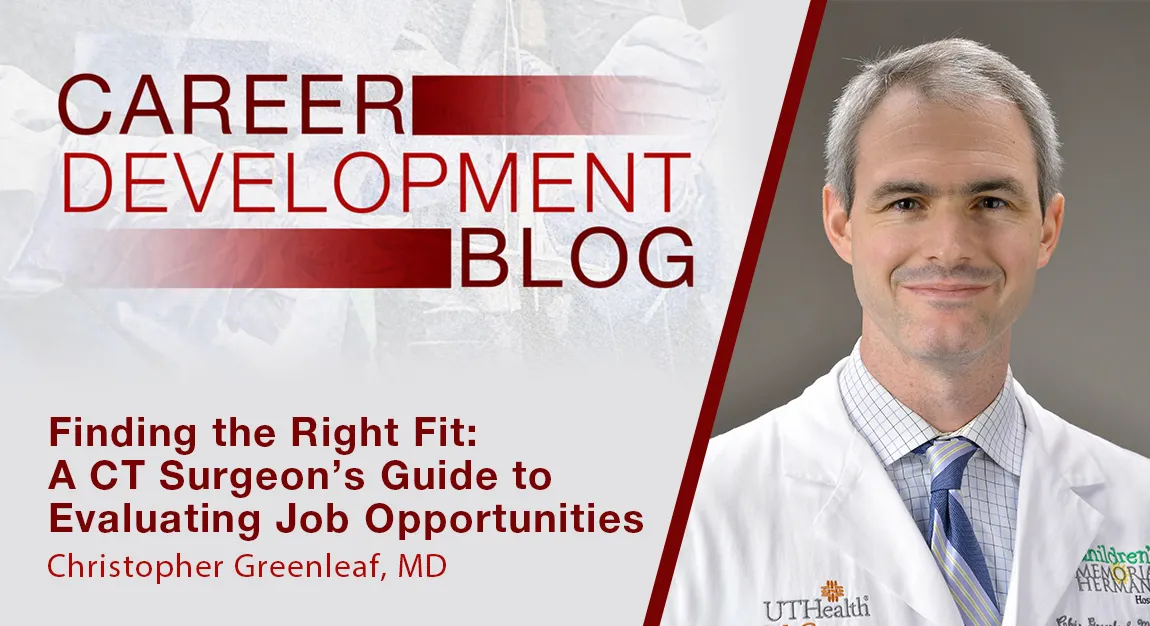- Choosing the right job as a cardiothoracic surgeon is crucial for long-term satisfaction.
- Evaluate personal goals, mentorship opportunities, and institutional support when considering job offers.
- Because every job transition can be impactful, take your time, ask the right questions, trust your instincts, and lean on your mentors.
Starting your first job, or making your first move, as a cardiothoracic surgeon is a big step. The right decision can shape your professional and personal life for years to come. You would prefer not to be that person who makes the wrong choice and who bounces from wrong job to wrong job for the next 10 years. As someone who’s been on both sides of the table, I wanted to share a few key considerations to help guide you through the process. This is just a starting point. I hope that you find at least a few useful pearls to help guide you.
Start With Yourself: What Do You Actually Want?

Before you look at call schedules or research funding, take a moment to be genuinely introspective. What motivates you? What matters to you outside of the operating room? Are you drawn to high-volume centers, or would you thrive in a more balanced environment with time for teaching, research, or family?
Write down your priorities. Include professional goals, lifestyle, geography, proximity to support systems, and spousal career opportunities. If you don’t know what you want, even the best offer can turn out to be a mismatch.
The Heart of the Job: Mentorship and Partners
After family and personal requirements, your first priority for these first jobs should be mentorship. The next priority should also be mentorship. All the money in the world can’t make up for getting the proper initial structure and guidance to set you up to be the best clinician, academician, and person in your early years. Ask direct questions: Will I be mentored? What does mentorship look like here? Who have you mentored in the past? Can I contact them?
Pay close attention to how future partners talk about each other. Is there mutual respect? Are they excited for you to join, or just looking to cover the call? A supportive group should want you to succeed. The night before dinner is an excellent opportunity to gauge how the partners interact in a social situation.
Gauging Institutional Support
Look beyond your immediate team. What’s the hospital’s vision for cardiac or thoracic surgery? Is there genuine investment in growing the program?
Ask about volume trends, new technologies, marketing support, and collaborative relationships with other specialties. Who controls marketing? Who will take you around to introduce you to referring providers? If I want to purchase an expensive item for my clinical practice, how many people must sign-off on it? How long does that typically take?
Comparing Apples to Apples
It’s tempting to focus on salary, but early-career decisions should consider the entire opportunity. Academic centers may offer prestige and mentorship, but private practices can provide autonomy and faster financial growth. Hybrid models exist too and each comes with trade-offs.
Make a spreadsheet. Include not just base salary, but call expectations, bonus structure, vacation time, CME support, research time, path to partnership, and the vibe you got from the team. You'll see what really matters to you.
Understanding Contracts and Negotiation
Don’t let the contract be an afterthought. It’s not just legal fine print; it’s a reflection of how your future employer values you. Watch for vague clauses, unclear expectations about productivity, or restrictive non-competes.
Have someone experienced look over your contract. You don’t have to accept the first draft. You can negotiate.
Benefits: The Hidden Dollars
Benefits can make a significant difference in your total compensation package. Dig into health coverage, retirement plans, disability insurance, student loan repayment, relocation support, and parental leave policies. A slightly lower salary with excellent benefits can be a better long-term decision.
Don’t Rush
You don’t need to decide overnight. It’s okay to ask for time to think. Talk with mentors, trusted friends, and family. Your spouse will see through what you are overlooking. Go visit again. Ask the nurses and anesthesiologists what the culture is like. You're not just choosing a job; you’re choosing your new professional home.
Final Thought
Every job transition feels impactful because it is. Take your time, ask the right questions, trust your instincts, and lean on your mentors.
The change in tone and tenor of the job interview is significantly different from your residency and fellowship interviews, where you were on your heels somewhat. Now you are the desired prize. Enjoy yourself, and if you fail this time, you’ll have another chance with the next job opportunity… and maybe the one after that.
